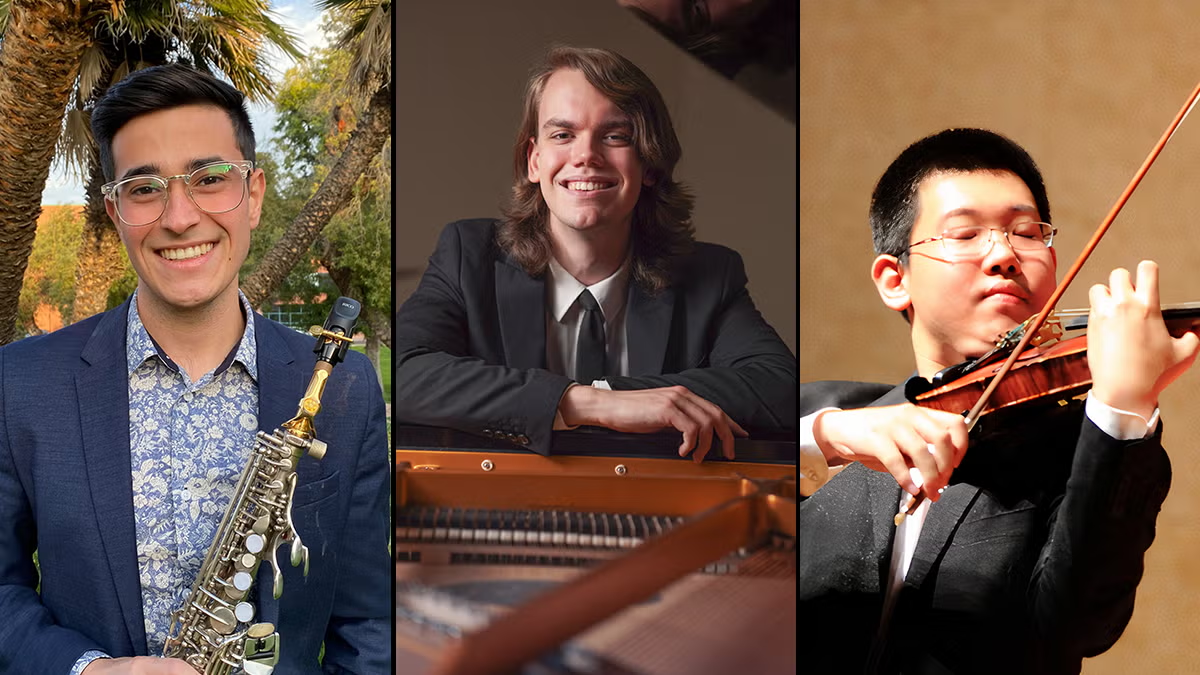3 ASU music students awarded first place at regional and state virtual competitions

Matthew Fox, John Solari and Weichao Zhu
Two undergraduates and one graduate student in the ASU School of Music, Dance and Theatre received first place awards in the Music Teachers National Association (MTNA) Southwest Division competition. The regional competition includes Arizona, California, Hawaii, Nevada, New Mexico and Utah.
The students also won first place in their respective categories at the MTNA state competition, which advanced them to the regional competition. All three students won in the young artist solo performance category in both competitions.
Matthew Fox, Bachelor of Music in performance, won in the wind competition (saxophone), Weichao Zhu, Bachelor of Music in performance, won in the string competition (violin) and John Solari, Master of Music in performance, won in the piano competition.
Fox studies with Associate Professor Christopher Creviston, this year being his senior year. Zhu began his studies with Professor Danwen Jiang almost three years ago. Graduate student John Solari has studied with Associate Professor Baruch Meir since 2015, after meeting him at a summer festival in Italy in 2014. Solari also received his Bachelor of Music in performance (piano) at ASU in 2019.
All three students will now compete as finalists in the prestigious MTNA national competition. Winners will perform virtually at the national conference on March 13–17.
The students’ competition experience ranges from a veteran competitor to a first-time applicant and from highly experienced at online applications and virtual recordings to a first-time learner on how to apply and successfully record in an online format.
A veteran competitor, Fox said he has learned that “you never win everything you apply for — you win some, you lose some — but if you don’t apply, you will lose all.”
Zhu, who was encouraged to participate by Jiang, is a first-time virtual competitor.
“Creating successful performance recordings during this time of the COVID-19 pandemic is quite challenging,” said Zhu. “The process of self-recording performances taught me how to create a successful video — proper position of the camera, angle of accompanist, standing at the right place in front of the camera and operating sound check before recording are important skills to master. Another challenge of competing virtually is being able to adapt to the performing environment without the audience and still be able to play with passion and excitement as if the audience is in the hall.”
The students began preparing for the competition in summer and early fall to develop a program of approximately 45 minutes of music. Fox and Solari worked with their professors and practiced extensively as solo performers. Zhu took lessons with Jiang every week during summer, practiced daily and rehearsed weekly with his accompanist in early fall. All the students met virtually with their professors via Zoom and some used YouTube recordings to review and further improve.
“For me to provide high-level instruction, I needed to be able to provide attention to interpretation, sound nuances, musical expression and technical refinement necessary and important in preparing for a competition,” said Meir, professor of piano. “There were too many sound distortions playing piano through Zoom, so John made a recording for each lesson, posted it to YouTube and we would share the recording through Zoom during the lesson. This added a new positive and different dimension to our lessons as John was able to hear himself from the side, which is like having a third ear.”
Jiang has been teaching remotely through Zoom since March, using occasional prerecorded student performances, and said the virtual lessons have been surprisingly successful for her students.
“Weichao is one of the great examples of many outstanding students who consistently work hard and thrive to accomplish, despite any challenge caused by the pandemic,” said Danwen Jiang, professor of violin. “Only a junior, he is playing some of the most difficult repertoire written for the violin.”
In addition to Zhu, one of Jiang’s graduate students, Sicong Chen, was named an alternate in the MTNA young artist state solo performance competition.
Solari, also a first-time virtual competitor, said Meir suggested the competition to him.
“The magic of live performance comes from the energy shared between performer and audience and the artistic image presented by the performer,” said Solari. “I am an artist because I want to leave something behind. Music is bittersweet in this respect, disappearing as soon as it has been created. But recording has its own magic and finally, it stays behind.”
All of the students said they believe that competing is an important part of a musical career.
“While competitions are not integral to the amazing music education at ASU, I find that it pushes me to prepare for a goal outside of our standard performance opportunities and helps me strive for perfection,” said Fox.
Zhu’s advice to students interested in competing is to “enjoy the process of preparation, believe in yourself, always push yourself and seek to play better.”
Jiang said the process of preparing for a competition requires commitment and a huge amount of effort from both the participating student and the teacher.
“One piece of advice I always give my students is that they consider competitions as opportunities to learn and hone their skills through the preparation process and to learn from other outstanding performers,” said Jiang.
The students and teachers all agreed that though winning a competition is certainly exciting, it is also important to enjoy and learn from the total experience.
“One should take competing as a learning experience, one that allows you to prepare, polish and bring your art to the highest level,” said Meir. “One that makes you grow as an artist and musician.”